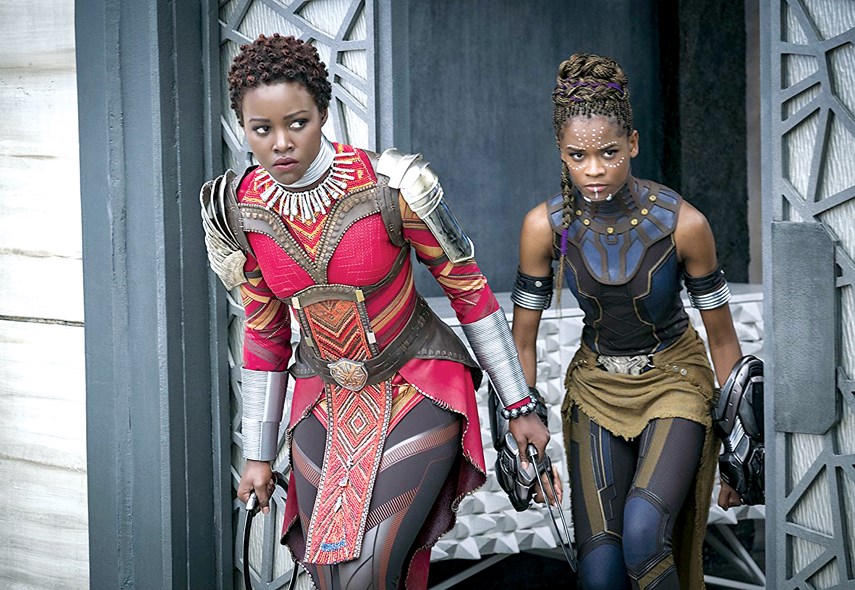Black Panther. Directed by Ryan Coogler. Starring Chadwick Boseman, Michael B. Jordan and Lupita Nyong’o. Rating: 8 (out of 10).
There’s something different about Marvel-Disney’s Black Panther.
And no, I don’t mean the obvious, the fact that the Avengers spinoff features an almost exclusively African-American and African cast. Black Panther is the first superhero movie to look outside the U.S. to find a world worth saving.
Blame that on the deep political and social cleft south of the border, for sure, but you can also chalk it up to the disproportionate foreign market share demanding a more global world view from its product: while movie theatre attendance stateside hit a 27-year low last year, international box office was up six per cent. Is it any wonder, then, that studios have got to rethink their formula?
That’s not to minimize the seismic importance of the debut of the first black superhero in a major motion picture and what it means to people of colour who, up to this point, had to wait around for a white guy to save the day. In the same way Princess Tiana broke boundaries in 2009’s Disney’s The Princess and the Frog, so too is Chadwick Boseman’s Prince T’Challa poised to irrevocably mix things up (with a tip of the hat to Wesley Snipes in Blade, of course).
The mythical kingdom of Wakanda has been spared an influx of “colonizers” thanks to the secret city hidden within, a city said to be El Dorado (apparently, explorers were looking on the wrong continent). The city is a modern, technological marvel thanks to its possession of an alien substance known as Vibranium, which also gives the Wakandan ruler special powers.
Prince T’Challa inherits the throne and succeeds his father in wearing the special Black Panther suit, in a nice narrative tie-in with Captain America: Civil War. The suit gets some upgrades courtesy of his brilliant sister (scene-stealer Letitia Wright) and T’Challa gets some muscle from an army of women warriors including Okoye (The Walking Dead’s Danai Gurira), who does some major damage with a wig at one point. The movie is nothing if not egalitarian with its gender roles.
But paradise is lost when Afrikaner plunderer Ulysses Klaue (Andy Serkis, oozing malice) stumbles onto Wakanda’s secret and convinces T’Challa’s disgruntled cousin Erik Killmonger (Michael B. Jordan) that Wakanda needs to share the wealth. Klaue just wants to get rich, of course, but Killmonger looks to the potential for a global black-power uprising, and is basically the reason the NRA is still in business.
Killmonger is a conflicted villain: a black-ops soldier who grew up in poverty in the U.S, he yearns for a homeland but has seen enough of how the African diaspora is treated in the outside world to know that Wakanda can’t keep to itself forever. So a villain, but one who demands our sympathy. There are parallels here to the doctrines of Martin Luther King Jr and Malcolm X, a peaceful approach to change versus violent revolution. Not that Black Panther himself can get by without cracking more than a few skulls, though his ex Nakia (Lupita Nyong’o) is continually trying to counsel him on better solutions.
The film is replete with action sequences that compete with other films in the genre, though Black Panther falls into that predictable superhero pitfall of more-is-less in the third act. But the kingdom of Wakanda is rich and gorgeously rendered by director Ryan Coogler and cinematographer Rachel Morrison, and Kendrick Lamar oversees an urgent, pulsing multinational soundtrack. The cast is top-notch, including Angela Bassett, Forest Whitaker, this year’s Best Actor nominee Daniel Kaluuya and Martin Freeman in addition to the leads.
Black Panther is a film that uses political theory as more than a plot-pushing gimmick without losing its wonder, humour and bad-ass action. Kudos to the studio and to filmmakers for looking outside the starched-white box.



